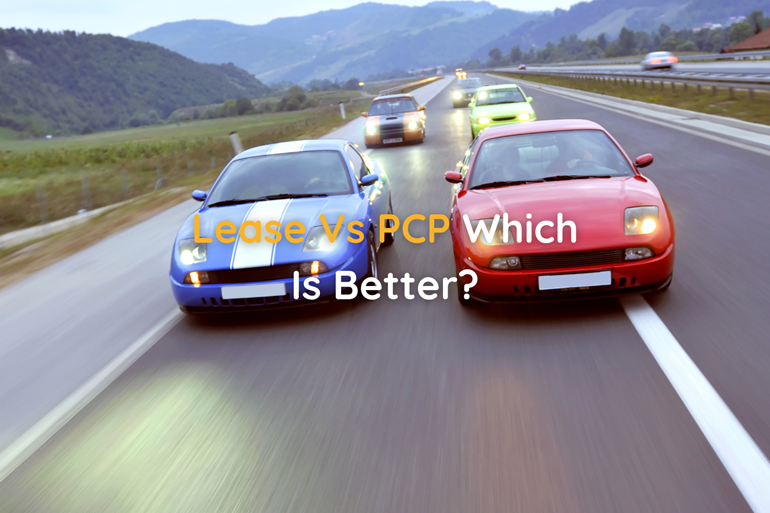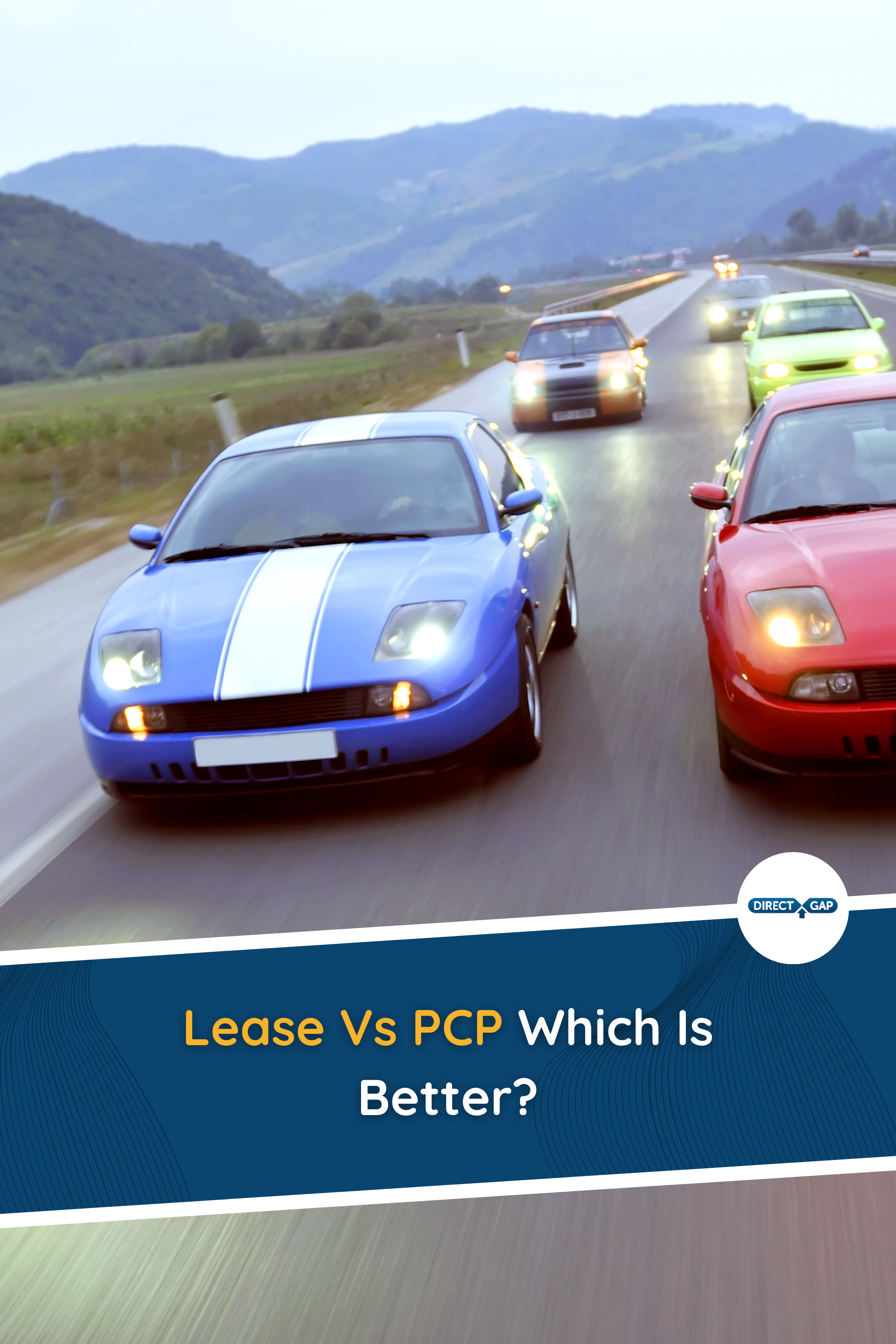
Lease vs PCP | Which Is Better?
Not Sure Which To Choose For Your Next Car Financing? Here’s The Low Down On PCP & Lease…
Quick Links
- Introduction
- Will Car Finance Affect My Credit Score?
- What Amount Of Car Finance Can I Afford?
- What's The Difference Between Leasing And PCP?
- Lease Vs PCP: Which Is Better?
- So, Which One Is Right For You?
- Our Final Word
Introduction
Choosing how to finance a car can feel like a minefield. With so many options, it’s easy to get lost in the jargon and with more flexibility and bespoke choices hitting the market every day, things aren’t getting any easier.
Two of the most popular choices in the UK are leasing and PCP (accounting for over three-quarters of all privately purchased car financing); but which one is right for you? While they might seem similar at first glance, some key differences can make one option a better fit than the other, depending on your circumstances.
In this article, we're comparing the two, so you can make an informed decision on how to finance your next car purchase. First though, as always, let's answer some of your most asked questions:
Will Car Finance Affect My Credit Score?
Yes, car finance will impact your credit score in several ways:
- Credit checks: A credit check, when companies 'look up' your details when making a finance application can impact your credit score. Too many credit checks, particularly in a short space of time, will hurt your score.
- Missing payments: Missing payments on your car finance can harm your credit score.
- Paying on time: Making payments on time, every month, will have a positive impact on your credit score, showing you are a responsible and trusted lender.
What Amount Of Car Finance Can I Afford?
There's no set rule on the amount of car finance you can afford, aside from, it should never be more than you're comfortable with. If a car deal makes you feel like you'll be under financial pressure; walk away.
If you do want a general rule of thumb most financial experts recommend no more than 10% of your monthly income should go towards finance repayments. We recommend using Money Helper's budget planner before making any decisions.
What’s the Difference Between Leasing and PCP?
Before we compare the pros and cons, let’s quickly define each option.
- Leasing (Personal Contract Hire): You pay a fixed monthly fee to use the car for a set period (usually 2–4 years), sometimes with an initial payment, but you never own it. At the end of the contract, you simply hand the car back.
- PCP (Personal Contract Purchase): You make lower monthly payments than a traditional car loan thanks to the (optional) final lump sum; referred to as a balloon payment.
How Does PCP Work? Check out our explainer video below:
Now that we’ve covered the basics, let’s see how they compare.
Lease Vs PCP: Which Is Better?
Cost: Which One is Cheaper?
Both options offer lower monthly payments compared to a traditional hire purchase (HP) agreement, but there are some cost differences.
- Leasing usually has slightly lower monthly payments because you're only covering the cost of the car’s depreciation over the lease period.
- PCP payments can be higher, as you're paying towards potential ownership. However, if you don’t plan to keep the car at the end, it can work out similarly to leasing.
Top Tip: Leasing often requires a higher initial payment, whereas PCP deals can sometimes be set up with a lower deposit, in some cases, with no deposit at all.
Overall, leasing a car will provide cheaper monthly payments, but, as always, this depends on the finance figures, car type, length of financing and your circumstances.
Ownership: Do You Want to Keep the Car?
This is one of the biggest deciding factors between the two.
- With leasing, ownership is never an option; you’ll always have to return the car at the end.
- With PCP, you have three choices at the end of the contract:
- Buy the car by paying the balloon payment.
- Hand the car back and walk away.
- Trade it in for a new car, using any positive equity as a deposit.
If you like the idea of eventually owning your car, PCP is the only way to go. If you just want to drive a new car every few years without any hassle leasing may be more suitable (although, this is technically feasible using PCP too, if you opt to continually trade the car in).
Our advice? If you’re hell-bent on a ‘brand new’ car, leasing tends to provide more competitive options if you accept a fixed monthly payment.
Already have a PCP? Take a look at our article; Should You Buy, Return Or Upgrade At The End Of Your PCP Deal?
Mileage Limits: Watch Out for Extra Charges
Both leasing and PCP agreements come with mileage limits, and exceeding them can be costly.
- Leasing contracts often have stricter mileage limits, and excess mileage fees can be steep.
- PCP agreements also have mileage limits, but if you choose to buy the car at the end, the mileage doesn’t matter.
If you do a lot of miles each year, PCP might be a safer bet, as it gives you the option to keep the car instead of facing excess mileage penalties.
When you’re getting a quote for either lease or PCP don’t be tempted to lie about your mileage. Whilst this may make your monthly repayments cheaper, it will have consequences at the end of your term, as you’ll be charged for excess mileage, regardless of which finance type you choose.
For more information on PCP charges, check out our article; Common PCP Mistakes (That Could Cost You Money)

You'll be charged for every mile you go over your agreed mileage.
Flexibility: Which Option Gives You More Freedom?
Leasing is very rigid; once you sign the agreement, you’re locked in for the duration. If your circumstances change and you want to get out of the contract early, you’ll likely have to pay a penalty.
Some people, however, prefer this ‘certainty’, making it easier to budget knowing there’s one fixed monthly payment for a fixed term, unlike PCP which could have some surprises at the end of the term, particularly with the final valuation of the car.
PCP offers more flexibility. If your needs change, you can sell potentially return the car or use any positive equity towards another deal. In a lot of cases, dealerships or finance providers will offer an incentive such as a ‘deposit contribution’ for you to take on a new PCP deal.
What Is A Deposit Contribution?
In simple terms, a deposit contribution is where a finance company or dealership adds extra funds to your deposit. For instance, if you have your own deposit of £3000 and a dealership offers a £2000 deposit contribution, you’ll have a total of £5000 deposit towards your next car.
Typically, deposit contributions come with some eligibility criteria, such as choosing a certain finance type, lender, finance terms, vehicle make and vehicle model. Deposit contributions are often used as an incentive to do business with the dealership or finance provider.
Maintenance: Who Covers the Costs?
With both types of finance, you will most likely be liable for the servicing and maintenance of the car. However, as lease cars are generally available on new cars only (as opposed to PCP which is available for used cars) there may be a grace period for MOTs as new cars only need one on their third anniversary.
Top Tip: Some dealerships offer a ‘service plan’, which covers the services your car will need over the lifetime of your finance agreement. You can, in most cases, pay this monthly as part of your agreement, to minimise those big ‘one-off’ spends.
Other after-market products can help reduce your maintenance costs too, such as Tyre & Alloy Wheel Insurance, which provides replacement cover for damaged wheels and tyres and Scratch & Dent Insurance which can cover minor bumps and repairs (that you would otherwise need to pay for at the end of your agreement).
Credit Checks & Eligibility: Is One Easier to Get?
Both leasing and PCP require a credit check, but leasing tends to be stricter. Since the finance company technically owns the car throughout the lease, they want to ensure you’re a low-risk customer. PCP is slightly easier to qualify for, especially if you have a decent deposit.
As always, it’s worth considering your personal circumstances and you should only apply for either if you have all the facts and it’s suitable for you.
Protecting Against Negative Equity
It's worth noting that both lease and PCP cars can suffer from depreciation and negative equity, where the car's value is lower than the amount still owed on finance. In most cases, this is particularly noticeable on lease cars, which depreciate at a higher rate when new. Consider Lease Gap Insurance to protect against financial risk, if your car is ever written off.
So, Which One Is Right for You?
Choose Leasing If
✔ You want the lowest possible monthly payments.
✔ You never want to own the car.
✔ You like getting a brand-new car every few years.
✔ You don’t drive excessive mileage.
✔ You want to include maintenance in your monthly payments.
Choose PCP If
✔ You like having the option to buy the car at the end.
✔ You want more flexibility in case your circumstances change.
✔ You do higher mileage and don’t want to risk excess mileage penalties.
✔ You might want to trade in the car and use any equity towards a new one.
Our Final Word
There’s no one-size-fits-all answer when it comes to leasing vs PCP; it really depends on your priorities. If you want low payments, no ownership, and no hassle, leasing is a great choice.
If however, you prefer flexibility and the option to own the car, PCP is likely the better fit.
Before signing any agreement, always check the small print, consider your future plans, and compare deals from different providers to ensure you’re getting the best value. At the end of the day, the right choice is the one that works best for you and your lifestyle.
We’d love to hear about your experiences with PCP and lease cars! Get in touch with us via social media today and let us know which you prefer. As always, don’t forget to share this article with your friends if you’ve found it useful.

Pinterest Friendly Cover!












